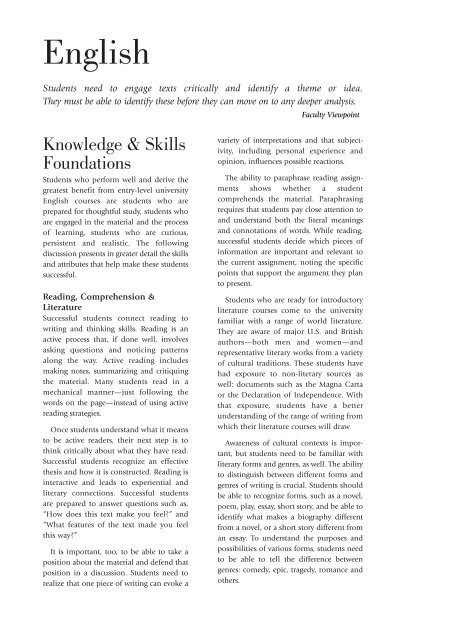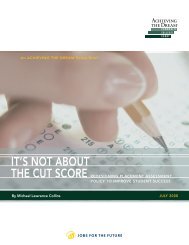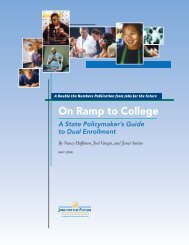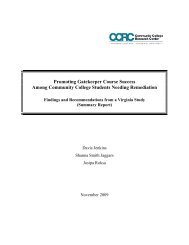Understanding University Success - Educational Policy ...
Understanding University Success - Educational Policy ...
Understanding University Success - Educational Policy ...
Create successful ePaper yourself
Turn your PDF publications into a flip-book with our unique Google optimized e-Paper software.
English<br />
Students need to engage texts critically and identify a theme or idea.<br />
They must be able to identify these before they can move on to any deeper analysis.<br />
Faculty Viewpoint<br />
Knowledge & Skills<br />
Foundations<br />
Students who perform well and derive the<br />
greatest benefit from entry-level university<br />
English courses are students who are<br />
prepared for thoughtful study, students who<br />
are engaged in the material and the process<br />
of learning, students who are curious,<br />
persistent and realistic. The following<br />
discussion presents in greater detail the skills<br />
and attributes that help make these students<br />
successful.<br />
Reading, Comprehension &<br />
Literature<br />
<strong>Success</strong>ful students connect reading to<br />
writing and thinking skills. Reading is an<br />
active process that, if done well, involves<br />
asking questions and noticing patterns<br />
along the way. Active reading includes<br />
making notes, summarizing and critiquing<br />
the material. Many students read in a<br />
mechanical manner—just following the<br />
words on the page—instead of using active<br />
reading strategies.<br />
Once students understand what it means<br />
to be active readers, their next step is to<br />
think critically about what they have read.<br />
<strong>Success</strong>ful students recognize an effective<br />
thesis and how it is constructed. Reading is<br />
interactive and leads to experiential and<br />
literary connections. <strong>Success</strong>ful students<br />
are prepared to answer questions such as,<br />
“How does this text make you feel?” and<br />
“What features of the text made you feel<br />
this way?”<br />
It is important, too, to be able to take a<br />
position about the material and defend that<br />
position in a discussion. Students need to<br />
realize that one piece of writing can evoke a<br />
variety of interpretations and that subjectivity,<br />
including personal experience and<br />
opinion, influences possible reactions.<br />
The ability to paraphrase reading assignments<br />
shows whether a student<br />
comprehends the material. Paraphrasing<br />
requires that students pay close attention to<br />
and understand both the literal meanings<br />
and connotations of words. While reading,<br />
successful students decide which pieces of<br />
information are important and relevant to<br />
the current assignment, noting the specific<br />
points that support the argument they plan<br />
to present.<br />
Students who are ready for introductory<br />
literature courses come to the university<br />
familiar with a range of world literature.<br />
They are aware of major U.S. and British<br />
authors—both men and women—and<br />
representative literary works from a variety<br />
of cultural traditions. These students have<br />
had exposure to non-literary sources as<br />
well: documents such as the Magna Carta<br />
or the Declaration of Independence. With<br />
that exposure, students have a better<br />
understanding of the range of writing from<br />
which their literature courses will draw.<br />
Awareness of cultural contexts is important,<br />
but students need to be familiar with<br />
literary forms and genres, as well. The ability<br />
to distinguish between different forms and<br />
genres of writing is crucial. Students should<br />
be able to recognize forms, such as a novel,<br />
poem, play, essay, short story, and be able to<br />
identify what makes a biography different<br />
from a novel, or a short story different from<br />
an essay. To understand the purposes and<br />
possibilities of various forms, students need<br />
to be able to tell the difference between<br />
genres: comedy, epic, tragedy, romance and<br />
others.






